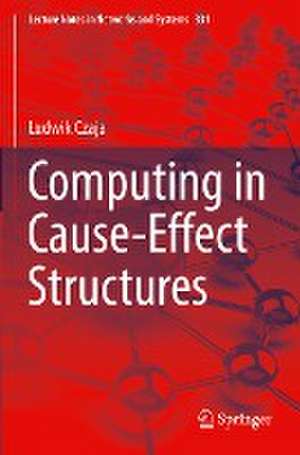Computing in Cause-Effect Structures: Lecture Notes in Networks and Systems, cartea 331
Autor Ludwik Czajaen Limba Engleză Paperback – 29 noi 2022
Toate formatele și edițiile
| Toate formatele și edițiile | Preț | Express |
|---|---|---|
| Paperback (1) | 924.80 lei 6-8 săpt. | |
| Springer International Publishing – 29 noi 2022 | 924.80 lei 6-8 săpt. | |
| Hardback (1) | 931.08 lei 6-8 săpt. | |
| Springer International Publishing – 28 noi 2021 | 931.08 lei 6-8 săpt. |
Din seria Lecture Notes in Networks and Systems
- 20%
 Preț: 1019.63 lei
Preț: 1019.63 lei - 20%
 Preț: 1286.10 lei
Preț: 1286.10 lei -
 Preț: 282.79 lei
Preț: 282.79 lei - 20%
 Preț: 1463.18 lei
Preț: 1463.18 lei - 18%
 Preț: 1105.88 lei
Preț: 1105.88 lei - 20%
 Preț: 1462.99 lei
Preț: 1462.99 lei - 20%
 Preț: 1459.86 lei
Preț: 1459.86 lei - 20%
 Preț: 1464.33 lei
Preț: 1464.33 lei - 18%
 Preț: 1398.62 lei
Preț: 1398.62 lei - 20%
 Preț: 1455.89 lei
Preț: 1455.89 lei - 20%
 Preț: 999.35 lei
Preț: 999.35 lei - 20%
 Preț: 1348.81 lei
Preț: 1348.81 lei - 18%
 Preț: 966.27 lei
Preț: 966.27 lei - 20%
 Preț: 1690.34 lei
Preț: 1690.34 lei - 20%
 Preț: 1231.37 lei
Preț: 1231.37 lei - 20%
 Preț: 1317.46 lei
Preț: 1317.46 lei - 20%
 Preț: 1325.71 lei
Preț: 1325.71 lei - 20%
 Preț: 1833.90 lei
Preț: 1833.90 lei - 20%
 Preț: 1979.90 lei
Preț: 1979.90 lei - 20%
 Preț: 1948.56 lei
Preț: 1948.56 lei - 20%
 Preț: 755.70 lei
Preț: 755.70 lei - 20%
 Preț: 700.41 lei
Preț: 700.41 lei - 20%
 Preț: 2272.77 lei
Preț: 2272.77 lei - 5%
 Preț: 1898.20 lei
Preț: 1898.20 lei - 20%
 Preț: 1330.67 lei
Preț: 1330.67 lei - 20%
 Preț: 1468.26 lei
Preț: 1468.26 lei - 20%
 Preț: 988.32 lei
Preț: 988.32 lei - 20%
 Preț: 1749.74 lei
Preț: 1749.74 lei - 20%
 Preț: 1790.99 lei
Preț: 1790.99 lei - 18%
 Preț: 1107.73 lei
Preț: 1107.73 lei - 18%
 Preț: 1160.45 lei
Preț: 1160.45 lei - 18%
 Preț: 1549.36 lei
Preț: 1549.36 lei - 20%
 Preț: 1642.52 lei
Preț: 1642.52 lei - 18%
 Preț: 3101.88 lei
Preț: 3101.88 lei - 24%
 Preț: 1770.57 lei
Preț: 1770.57 lei - 18%
 Preț: 1608.06 lei
Preț: 1608.06 lei - 15%
 Preț: 577.07 lei
Preț: 577.07 lei - 20%
 Preț: 1958.48 lei
Preț: 1958.48 lei - 20%
 Preț: 1943.60 lei
Preț: 1943.60 lei - 18%
 Preț: 1404.93 lei
Preț: 1404.93 lei - 20%
 Preț: 1463.49 lei
Preț: 1463.49 lei - 18%
 Preț: 1570.03 lei
Preț: 1570.03 lei - 20%
 Preț: 1018.85 lei
Preț: 1018.85 lei - 18%
 Preț: 1229.10 lei
Preț: 1229.10 lei - 20%
 Preț: 1646.63 lei
Preț: 1646.63 lei - 20%
 Preț: 1299.31 lei
Preț: 1299.31 lei
Preț: 924.80 lei
Preț vechi: 1156.00 lei
-20% Nou
Puncte Express: 1387
Preț estimativ în valută:
176.96€ • 185.26$ • 146.42£
176.96€ • 185.26$ • 146.42£
Carte tipărită la comandă
Livrare economică 08-22 aprilie
Preluare comenzi: 021 569.72.76
Specificații
ISBN-13: 9783030888152
ISBN-10: 3030888150
Pagini: 172
Ilustrații: XV, 172 p. 147 illus., 68 illus. in color.
Dimensiuni: 155 x 235 mm
Greutate: 0.27 kg
Ediția:1st ed. 2022
Editura: Springer International Publishing
Colecția Springer
Seria Lecture Notes in Networks and Systems
Locul publicării:Cham, Switzerland
ISBN-10: 3030888150
Pagini: 172
Ilustrații: XV, 172 p. 147 illus., 68 illus. in color.
Dimensiuni: 155 x 235 mm
Greutate: 0.27 kg
Ediția:1st ed. 2022
Editura: Springer International Publishing
Colecția Springer
Seria Lecture Notes in Networks and Systems
Locul publicării:Cham, Switzerland
Cuprins
Basic Concepts of Cause-Effect Structures.- Computing with Natural Numbers.- Computing logical (Boolean) functions.- Modelling data structures.- Relationship of Reaction Systems and Cause-Effect Structures.- Rough Cause-Effect Structures.- Relationship of c-e structures to Petri Nets.- Time in Cause-Effect Structures.- Examples from several fields.
Textul de pe ultima copertă
This book focuses on numerous examples of tasks represented by c-e structure. Cause–effect (c-e) structures are dynamic objects devised for algebraic and graphic description of realistic tasks. They constitute a formal system providing means to specify or implement (depending on degree of description generality) the tasks. They can be transformed, thus come under simplification, in accordance with rules-axioms of their algebra. Also, their properties can be inferred from the axioms. One objective of this book is presentation, by many realistic examples, of computing capability of c-e structures, without entering into mathematical details of their algebra. In particular, how computing with natural numbers and in propositional calculus can be performed by c-e structures and how to specify bahaviour of data structures. But also demonstration of many other tasks taken from the area of parallel processing, specified as c-e structures. Another objective is modelling or simulation by means ofc-e structures, of other descriptive systems, devised for tasks from various fields. Also without formalizing by usage of functions between the systems. This concerns formalisms such as reaction systems, rough sets, Petri nets and CSP-like languages. Also on such, where temporal interdependence between actions matters. The presentation of examples is prevalently graphic, in the form of peculiar nets, but accompanied by their algebraic and set-theoretic expressions. A fairly complete exposition of concepts and properties of the algebra of cause-effect structures is in the previous book appeared in the Lecture Notes in Networks and Systems series. But basic notions of c-e structures are here provided for understanding the examples.
Caracteristici
Presents the computing capability of c-e structures, without entering into mathematical details of their algebra Shows how computing with natural numbers and in propositional calculus can be performed by c-e structures Focuses on numerous examples of tasks represented by c-e structures
